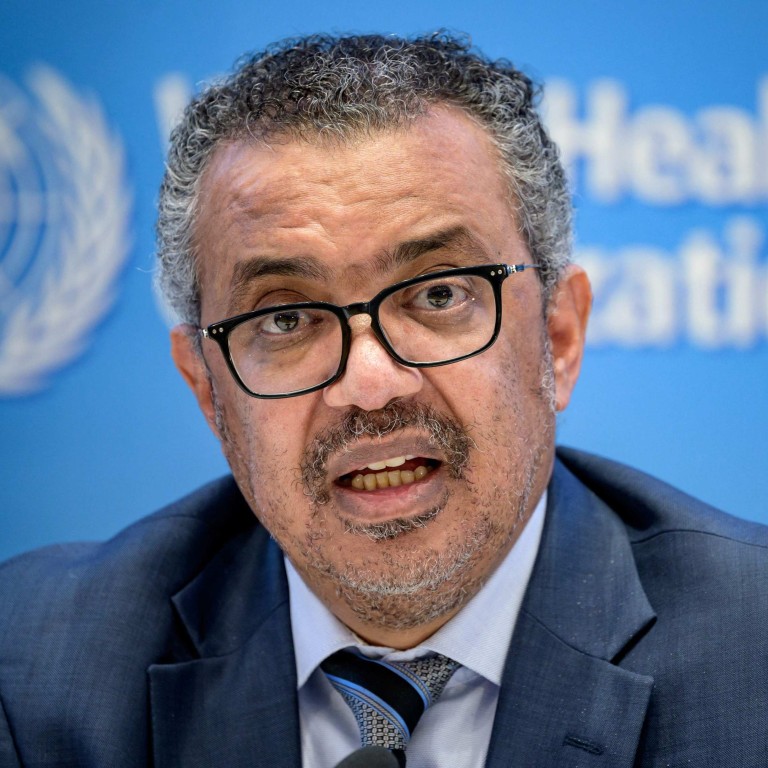
Coronavirus: worst stage of the pandemic may end in 2022, WHO chief says
- Two years after the new coronavirus emerged, Tedros Adhanom Ghebreyesus says ending health inequity ‘remains the key’
- He urges countries to achieve a ‘New Year’s resolution’ of vaccinating 70 per cent of their populations by July
“Ending health inequity remains the key to ending the pandemic,” WHO director general Tedros Adhanom Ghebreyesus told reporters.
The call to action comes two years after the world first learned, in the final days of December 2019, of a mysterious illness circulating in central China’s inland port city of Wuhan.
In his comments, Tedros reflected on that time, when people around the world gathered for New Year’s Eve celebrations, and “a new global threat emerged”.
“Although we had little information, we had enough experience and expertise to know that this looked serious,” he said.
Since then, more than 284 million people globally have been confirmed infected with the new coronavirus and more than 5 million deaths have been recorded, according to Johns Hopkins University tracking, with real numbers likely much higher.
Unlike in the first year of the pandemic, populations have immune protection from past infections and vaccinations, but the WHO has still warned about spikes in hospitalisations driven by these surges.
Rapid development of safe and effective vaccines since the start of the pandemic has been a “scientific masterclass”, Tedros said, but fixing failures in their global distribution and pandemic politics would be critical in the coming year.
“Populism, narrow nationalism and hoarding of health tools – including masks, therapeutics, diagnostics and vaccines – by a small number of countries undermined equity, and created the ideal conditions for the emergence of new variants,” the WHO chief said.
“Misinformation, which has driven vaccine hesitancy, is now translating to the unvaccinated disproportionally dying.”
Will the coronavirus pandemic finally end in 2022?
Despite efforts from the WHO and its partners to create a system for equitable global distribution of the shots, rich countries monopolised doses for much of the year, with over 90 countries unable to vaccinate even 40 per cent of their populations in 2021.
Next year, the agenda must include sharing vaccines “faster and more equitably” and supporting countries to manufacture and roll them out to everyone, including via mobile vaccination teams, like those used against polio, Tedros said.
It would also require an expansion in who is making these life-saving products.
“Sharing technology and know-how, as well as waiving the intellectual property rights around Covid-19 tools should have happened early on in the pandemic … But it’s never too late to come together to do the right thing,” he said.
This was particularly urgent given the roll-out of booster shots around the world, which could again limit supplies to poorer countries, Tedros said.
The WHO chief also called for progress on understanding the origins of the pandemic. He said it was “vitally important” that the new body in charge of this work – the Scientific Advisory Group for the Origins of Novel Pathogens (Sago) – can make “quick” progress on a framework for researching the origins of pathogens, including the coronavirus that causes Covid-19.
Leaders should also act “with ambition” and swiftly as they build an international accord, such as a treaty, on pandemic prevention, preparedness and response – something countries agreed to move forward last month.
“This is the moment for leaders to banish the politics of populism and self-interest, which are derailing the Covid-19 response and threaten to undermine the response to the inevitable next disease X,” he said.
As for stopping this pandemic, which would require both public health measures to limit the spread of the virus and vaccinations, Tedros stressed the importance of meeting his deadline.
“We have 185 days to the finish line of achieving 70 per cent by the start of July 2022,” he said. “The clock starts now.”

